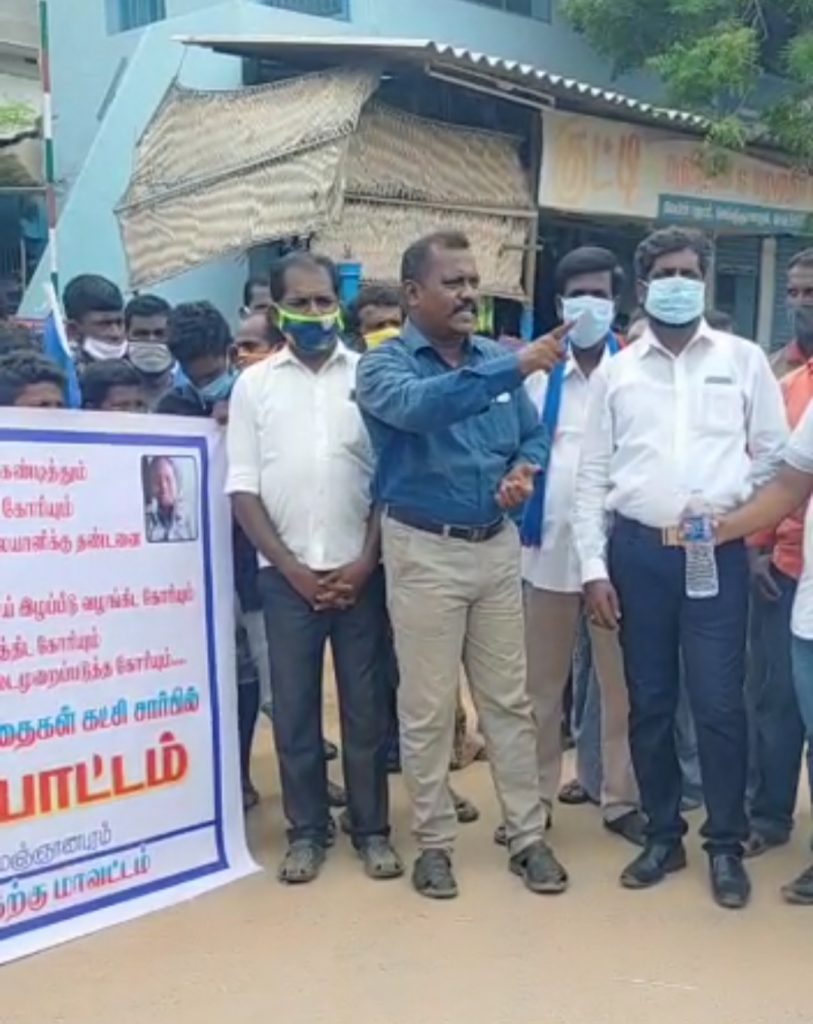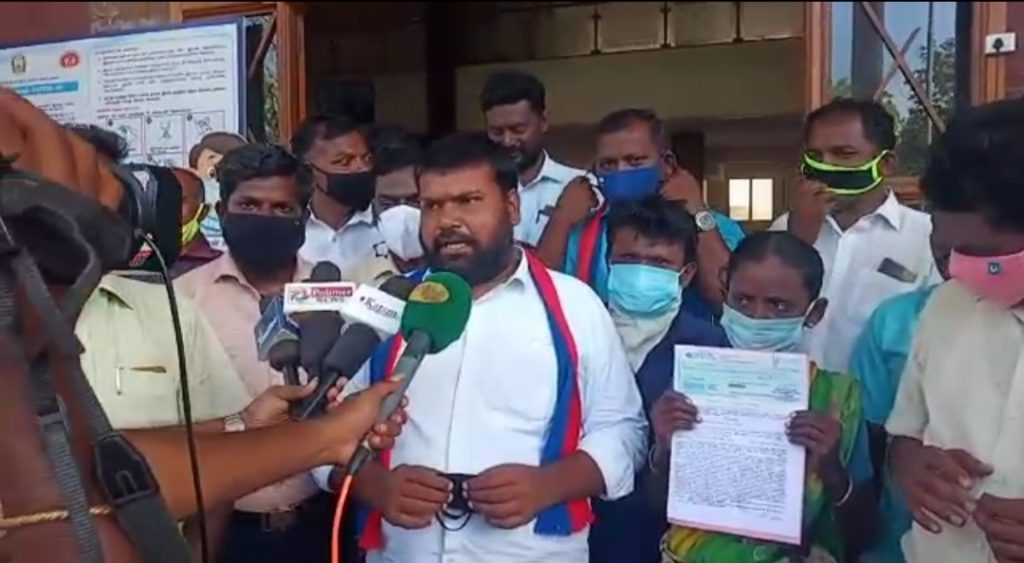By Sukanya Roy, TwoCircles.net
Kalvilai: At around 11 am on 15 July, an eight-year-old Dalit girl from Kalvilai village in Thoothukudi district in Tamil Nadu was seen entering nineteen-year-old Mutheeswaran’s house by the neighbours. His friend Nantheesh, also 19, was inside. Around 1 pm, local boys playing cricket saw the two speeding off on a TVS Excel motorbike carrying a blue drum. Soon, people started looking for the girl. They were told that she was last seen at Mutheeswaran’s house and suspicion arose regarding the drum that was being whisked off.
The same drum was found in stagnant waters under a small bridge in the village. An FIR was registered under Sattankulam Police Station by the girl’s mother Uchimakali and the two accused boys were arrested and booked under 302 (murder), POCSO Act, and Scheduled Caste and Scheduled Tribes (Prevention of Atrocities) Act.
The girl’s parents also suspect sexual assault. Mutheeswaran, son of Vallavan belongs to the Dalit community and Nantheesh belongs to the dominant OBC caste.
While many charge sheets are filed under SC/ST PoA, the rate of conviction in these cases is close to negligible.

A report reveals that Tamil Nadu registered 1934 cases under the SC/ST PoA act from 2011-2017, but the acquittal was given in 94.4% of verdicts.
The abysmal rate of conviction combined with rising incidents of violence against Dalits points to an alarming direction and necessitates us to see this murder as part of collective violence against Dalits.
An article by Sujatha Sivagnanam reveals that atrocities against Dalits in Tamil Nadu have increased nearly five-fold during the lockdown. Dalits who have been victimized were unable to commute to police stations, and the police refused to file FIRs, citing COVID-19 as the reason for their inaction.
A section of the Dalit population, which has been rendered especially vulnerable by this violence, is young children, especially girls under the age of eight.
Adv. Pandiyan, director of WITNESS, an organisation working to protect the rights of Dalits in Tamil Nadu, notes that, “The NCPCR guidelines show that violence against children from vulnerable communities, oppressed castes, and children on the streets, has increased in this COVID-19 lockdown.”
In the past two weeks, there have been three cases of brutal crimes against Dalit girls, which were reported at some length.

Before this murder in Kalvilai village, a seven-year-old girl in Pudukottai district was raped and murdered by a man, who then absconded from police custody when he was taken to a medical centre for a check-up.
In Thiruvarur district too, a young Dalit girl was brutally raped. In Kodarampatti village, a high caste-Hindu man assaulted a 14-year old Dalit boy by forcing him to carry his excreta in his hands and making him eat it.
Adv. Pandiyan highlights how a careful selection of the potential victim was at play here, as in all the other cases. He says, “The parents are extremely poor. Her father is a daily wage labourer. They don’t even have a proper house. It’s just a tin shed. She stayed alone at home while her parents went to work, giving the neighbours easy access to her privacy. Her age and background of being a poor and Dalit made her the most vulnerable victim.”
This profile fits all the other girls who were raped and murdered.
The Superintendent of Police, Thoothukudi district, S Jayakumar, told TwoCircles.net over the phone that, “There is no rape, only murder. The initial investigation by a scientific officer, as well as the post-mortem report, shows no signs of sexual assault.”
DSP Nagarajan was reluctant to comment. “The case has been handed over to CBI,” he said.
When asked what the post-mortem report had revealed, DSP didn’t answer and said, “it is under CBI now”.
The Additional SP, Selvan during a call, twice mentioned that one accused belonged to the same Dalit community. No mention of the other accused was made, who belonged to a dominant OBC caste.
The police claim that Mutheeswaran’s father Vallavan was mentally challenged and the little girl was asking to change the TV channel when in a fit of anger he strangled her. Local activists, however, make it clear that the father had nothing to do with the crime. The accused were addicts under the influence of drugs, the activists say.
In most of the initial reports, the happenings were dramatized to create effects of fleeting shock, horror and pity. The issues raised were how such a small demand could lead to such a heinous crime, the absolute inhumanity of the accused two, and so on. It was made out to be a case of bad luck.
In reality, young Dalit girls are being raped and murdered due to the prime factor of their caste, and weak socio-economic background. The case of mental disability is an exclusive, personal one and serves to divert attention and importance from the larger, systemic issue of caste-based crimes being deeply socially sanctioned and rarely condemned by the police and judiciary, allowing these oppressive realities to flourish.
In 2018, a Dalit family was brutally assaulted in Villupuram, and the mother and daughter had to be hospitalised. The police posited a vague theory of some sex offender roaming loose, and did not investigate the caste angle of this attack with any seriousness. The real culprit was never convicted.
The Thoothukudi and Villupuram cases have the same presiding officer, SP Jayakumar. “Just like two years ago, his modus operandi is the same with this case, to frame the accused as mentally disabled or deviant individuals,” said Pandiyan.
The Santhakulam police claim that the victim’s family is satisfied with the compensation of 4.12 lakh and a land patta.
Pandiyan laments that monetary compensation or relief is not meant to replace justice. “What kind of justice can we expect from an officer with a tarnished modus operandi? Rather, the police are a hurdle in getting us justice.”

The relatives of the girl, along with organisations and activists fighting for the rights of Dalits staged a protest at the Meignanapuram Bazar Street, close to the Meignanapuram police station demanding a fair probe into the case. They requested local Ministers and the District Collector to visit the site of the murder, and the canal where the body was dumped. Their demands fell on deaf ears as no bureaucrat deemed it important enough to comply with them.
“This is clearly due to their caste identity, officials never want to take anything with a caste angle seriously”, says Adv. Muthupandian, President of Sambarkula Velalar Sangam, a movement resisting caste-based atrocities.
Not only the police and the political bureaucracy but the judiciary has also effectively quashed the dignities and hopes of the marginalized Dalits.
In the devastating case of Kausalya-Shankar, the inter-caste couple was attacked in broad daylight in Tiruppur district, Tamil Nadu in 2016, and Shankar, a Dalit, was killed. In a lethal blow to justice, the Madras High Court acquitted all nine people who formed the ruthless attacking mob, including Kausalya’s father himself.
Kiruba Munuswamy, a Dalit advocate practising in the Supreme Court, wrote about the nepotism and caste hierarchy rampant in the Indian judiciary, stating that courts work with “the most openly biased system of senior engagement that rewards ‘face value’ rather than the competency of an advocate to represent the cause of a client”. Given that the Supreme Court has had only one Dalit Chief Justice in all of its existence, K. G. Balakrishnan, it clarifies, not anew, why Dalit issues are not given diligent and considerate legal and social treatment.
Commenting on the Kalvilai murder case, Munuswamy says, “Dalit women and children becoming victims of sexual violence shows how ineffective the State and Law enforcement agencies are. The government and the police allow these (excesses) against Dalits as they are not human enough because of their castes. Protection of Dalits is an immediate need. Otherwise, Dalits who are already dying of hunger due to job loss will die of violence.”
The silence and inaction of all institutional bodies, in this case, are staggering. No statements by child rights organisations or non-Dalit feminist organisations have been issued. It has sparked none of the outrage that the recent Santhakulam case of Jayaraj and Benicks’ custodial deaths did. It risks turning into another miniscule-lettered entry, too tiny to read for all the ladies and gentlemen of justice who are not blind, or at least fully, in the logbook of crimes that have been aggravated by casteist negligence.


